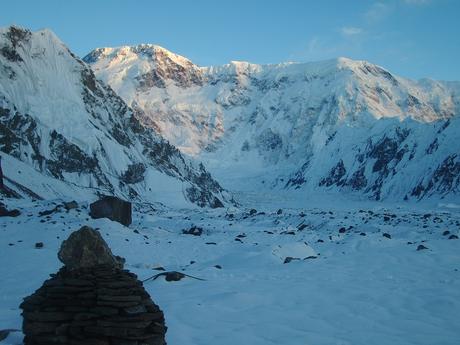 The winter climbing season is barely underway, and so far our attention has mostly been focused on Alex Txikon's no-O's attempt on Everest and the Polish team currently en route to K2. But there are some other interesting climbs to keep an eye on as well, including the latest expedition for Simone Moro and Tamara Lunger, which promises to be as cold as any of them.
The winter climbing season is barely underway, and so far our attention has mostly been focused on Alex Txikon's no-O's attempt on Everest and the Polish team currently en route to K2. But there are some other interesting climbs to keep an eye on as well, including the latest expedition for Simone Moro and Tamara Lunger, which promises to be as cold as any of them.
The duo, who spent most of last year climbing on Nanga Parbat together, are now heading to the Chersky Range in Siberia to take on what promises to be an interesting challenge. They've set their sights on Peak Pobeda, a 3003 meter (9852 ft) mountain that punishes climbers with its extreme cold rather than altitude.
In fact, Moro has called this the "coldest climb in history, on the coldest mountain on the planet." Just how cold will it be? According to ExWeb, the average temperature in this part of Siberia during the winter is roughly -43ºC/-45ºF, with the coldest temperature ever recorded in the area coming in at -71ºC/-95ºF. As if that weren't chilling enough, the mountain itself promises to be even colder.
The expedition team will include Moro and Lunger of course, but they'll also be joined by photographer Matteo Zanaga and a local mountain guide who is familiar with Peak Pobeda itself. They'll first travel to Russia, then out to Siberia, where they'll make a 3 hour ride on snowmobiles to get to their starting point. From there, they'll use cross country skis to approach the mountain, where they'll set up Base Camp and prepare for the climb.
Obviously there won't be much need for acclimatization on this expedition, but the extreme cold will still pose some serious challenges. High winds could limit access to the summit and the amount of snow on the mountain will also dictate the route and level of safety. Avalanches could be an issue as they make plans for an eventual summit bid. There are also some technical sections that will need to be overcome as well, which is never easy in bone-chilling temperatures.
We'll keep an eye on the progress of the team and report any updates as we get them. It should be another interesting winter expedition to follow.

